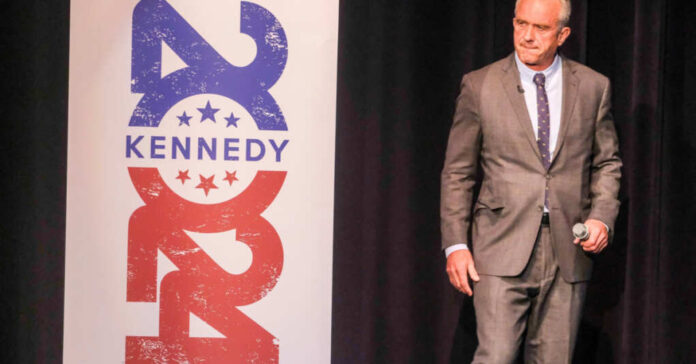
The Democratic National Committee (DNC) is reportedly upset by the results of the latest polls. Independent candidate Robert F. Kennedy Jr. is polling higher than any independent or third-party candidate in a generation. Because of this, he has the opportunity to influence the outcome of the 2024 election.
According to a recent Quinnipiac University poll, Kennedy’s approval rating among registered voters is at 22%, and that’s a big deal. There have only been three non-major-party candidates in polling history to hit more than 20% in an election year. In 1992, Ross Perot was the last independent candidate to poll over 20%. His high approval rating resulted in 19% of the popular vote. In a narrow election, 19% is enormous. If 19% of the votes go to RFK, Jr., it could affect who actually becomes the next president. It is likely that RFK Jr. would attract more votes from supporters of Biden than Trump.
On Friday, the DNC recognized that threat and lodged a formal complaint with the Federal Elections Commission, targeting Robert Kennedy Jr.’s presidential campaign for what they claim was a coordinated illegal “ballot access scheme” with Super PAC American Values 2024. DNC is alleging that American Values 2024 breached election laws by gathering signatures for Kennedy’s inclusion on the November ballot but will have to “integrate their expenses” with the campaign in a manner that violates federal election law.
According to the DNC, the crux of the issue lies in state laws from places such as Arizona, Illinois, and Michigan, which mandate that either the candidates themselves or their official campaign teams must undertake the collection of ballot signatures. This requirement places Kennedy’s campaign in a precarious position of navigating between adhering to state mandates and following federal election regulations.
In a press briefing, Bob Lenhard, DNC legal counsel, emphasized that fulfilling state and federal laws is an impossibility for Kennedy’s team. According to Lenhard, RFK, Jr., and the American Values 2024 are caught in a legal bind where compliance with both sets of laws is not possible.
The DNC has also pointed fingers at Tim Mellon, a notable Donald Trump benefactor, who has injected $15 million into American Values, as per federal records. The DNC sees this financial support as an effort by Trump’s associates to divert attention from President Joe Biden’s campaign by promoting Kennedy’s third-party candidacy.
During the press call, DNC representatives articulated concerns that Trump and his financial backers were leveraging Kennedy’s candidacy as a strategic diversion. DNC stated that “Trump and his megadonors are propping up RFK Jr. as a stalking horse.”
There is growing Democratic apprehension over the potential for third-party candidates to dilute Biden’s support base. Notably, RFK. Jr. initially launched his campaign in the Democratic primary as a challenger to Biden before pivoting to a third-party stance.
After the DNC accused Kennedy’s campaign of wrongdoing, the campaign denied any collaboration with the American Values 2024 or any other PAC. The campaign emphasized its commitment to following FEC guidelines and legal compliance. It called the allegations a baseless partisan attack and stressed that it had not been involved in any financial endeavors with the PAC.
For its part, American Values 2024 rebuffed the DNC’s complaint as a mere political tactic, asserting its independent efforts to secure Kennedy’s ballot presence in 12 states. Tony Lyons, a group co-founder, criticized the DNC’s actions as an affront to democratic principles, accusing the Biden administration and the DNC of undermining democracy to quash opposition.
Filing FEC complaints against perceived illicit campaign-PAC collaborations is not new. A recent example includes allegations against the super PAC Never Back Down for its close ties with Ron DeSantis’s paused presidential campaign. However, the DNC’s direct action against Kennedy’s campaign is highlighted by Lenhard as a significant and unusual step, driven by the unique legal challenges posed by state signature collection laws.














